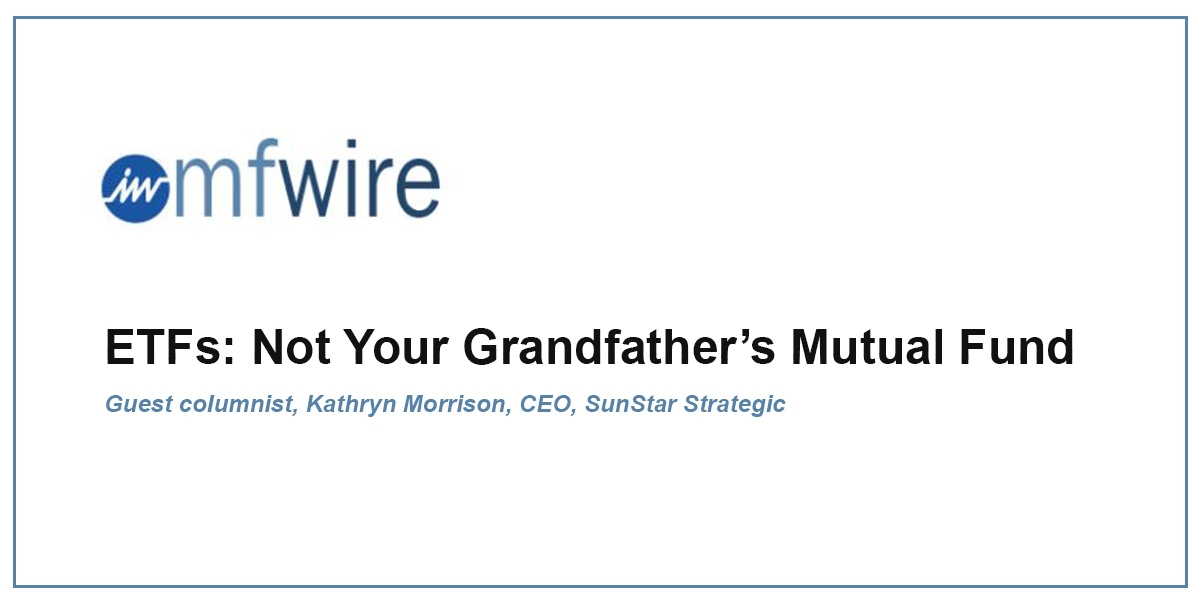Kathryn Morrison, president and CEO of SunStar Strategic, authored an article featured on MF Wire. Kerri Fronczak, AVP Creative & Digital, co-authored.
ETFs: Not Your Grandfather’s Mutual Fund
The ETF market is hot, money is flowing in and a chunk of it is coming from younger investors. Asset managers doing the “same old” marketing will lose out to competitors who are reaching these investors.
Legacy public relations and market strategies that have been successful attracting mutual fund investors over the past few generations need a new approach.
Not your grandfather’s investment
According to the Investment Company Institute, households of ETF investors have a higher financial risk tolerance than their older counterparts, who invest in traditional mutual funds and individual stocks.
Millennials and Generation Z are driving the growth of ETFs. They have grown up in a world of immediacy. Google has always put all the answers right at their fingertips. These generations have demonstrated a preference for “bite-sized” information – lengthy reports are dead. They want key bullet points versus long-winded paragraphs, performance charts versus historical context. Younger people demand information more quickly and directly than generations past.
For these investors, ETFs offer attractive features. An inexpensive entry point is just the tip of the iceberg. Holdings are reported daily and traded all day long. Investors can research ETFs and their performance almost in real time.
Traditional mutual funds and individual stocks often have a high point of entry. In the past, most younger investors would need to accumulate significant cash before being able to invest, although the recent introduction of fractional shares is the industry’s response. Most ETFs allow entry to investors with little capital.
The diversification an ETF offers, coupled with low fees, makes investing easier and more affordable. For ETFs with high share prices, fractional shares of ETFs offered by some online brokerages, make these more expensive shares affordable.
Making contact
Whether promoting an existing ETF, launching a new one, or converting a mutual fund, traditional public relations and marketing strategies are not enough. To reach younger investors you need to adapt your tactics.
Websites
Today’s investors go online first. Perhaps even more importantly, they overwhelmingly favor their smartphones. A mobile-friendly financial website must look and function flawlessly in 2022. Daily NAV and holdings should be easy to find. The unique differentiators, process and objectives need be front and center and easily digestible. Jargon-laden, text heavy pages are passé, today’s investors are drawn to headlines and bullets that can be read in a glance. Millennials are reported to spend only 31 minutes-a-day on their desktops versus 211 accessing the internet or apps on their smartphones.
Social Media Use
A self-report by Gen Z clocked 4.5 hours on social media daily, while Millennials spend about 3.8 hours each day. Gen Z is a video-driven generation, favoring organic content while scrolling online.
Younger generations spend more and more time on social media and with the rise of ‘finfluencers,’ it’s becoming more important for ETFs to invest time and resources there. YPulse reports Millennials are (still) most likely to get their news on Facebook, at 78% of Millennials who use social media to get their news, compared to just 37% of Gen Z. Meanwhile, 57% of Gen Z who use social media for news use TikTok to obtain news and information compared to 29% of Millennials, while YouTube leads the pack. Potential investors are also learning about investing and investment products on Twitter and TikTok. According to Insider, TikTok videos tagged with #finance, #investing or #stocktok had over 7 billion views.
News
According to a study by YPulse in June of 2021, 74% of young consumers report they use their phones regularly to keep up with news content, outpacing TV in second place at 41%. Millennials are only slightly more likely than Gen Z to say they use their phone to keep up with news, with 75% of 20-38-year-olds saying they use phones to regularly keep up with news. Only 10% of young people keep up with news using a non-digital source (i.e. newspaper, magazine, etc.). This is reflected in their top news sources: 47% of 13-39-year-olds say they use social media to get news and up-to-date information compared to 33% who rely on local TV news shows and 24% who rely on cable TV news shows. Interestingly, only 23% use a news app—showing that the expectation for many is that they’ll find the news on the platforms where they’re already spending their time.
YouTube
Savvy investors and even armchair analysts are finding great success hosting their own YouTube channels. They record live interviews with industry experts, or their own analysis of a particular stock or market trend. The videos are then archived on their channel and viewed by thousands. YPulse also found that 63% of 20-38-year-olds say they use YouTube, noting that some YouTubers have become trusted news sources.
Podcasts
Convince & Convert’s podcast statistics for 2021 report that podcast listeners have grown consistently for years. As of 2021, 56% of Americans 12-34 listen to at least one podcast per month, as do greater than 25% of those 55 plus. Eighty million Americans listen weekly, compared to 69 million Netflix account holders, suggesting a shift to audio from video. On average, they listen to eight podcasts each week. Either hosting or appearing on a popular financial podcast is a great way to reach young investors. Over 57% of American consumers over the age of 12 report listening to podcasts. They’re a popular method of digesting information while commuting, working out, traveling, etc. The most popular financial podcast according to Insider Monkey, June 2021, The Tim Ferriss Show had been downloaded more than one billion times.
Thematic ETFs
Investing with intention – or in a way that aligns with one’s values or interests – has grown exponentially over the last several years. ETFs that invest in a particular theme such as artificial intelligence, innovation, climate change, etc. are exciting and appeal to those wanting to make a difference with their investment. Morgan Stanley’s Institute for Sustainable Investing found that 86% of actively investing Millennials are interested in companies who are pursuing positive social and or environmental impact. In fact, they are twice as likely to invest in these companies vs. the general investing public.
What it all means
The stereotypical investor is late middle aged and planning for retirement. But the face of the investor is changing especially when it comes to ETFs.
Today’s young investor wants information that is quick and easy to understand. Why would they read a five-page stock commentary if they can get the gist in a 20-second TikTok video?
To reach and successfully connect with this audience, asset managers need to embrace new media tactics that are tailored specifically for the younger investors.
Kathryn Morrison serves as president and CEO of SunStar Strategic
Read the article on MF Wire



